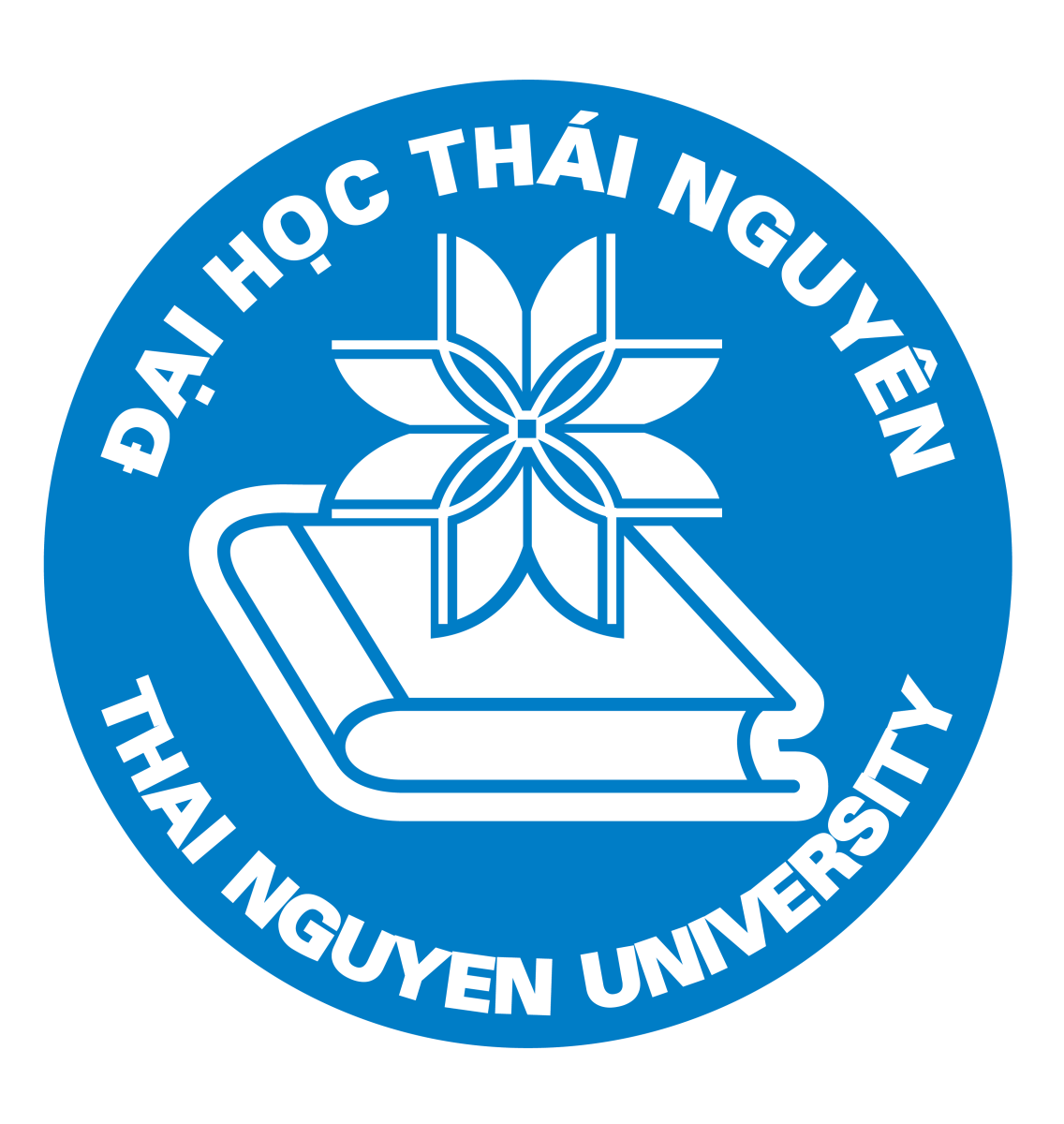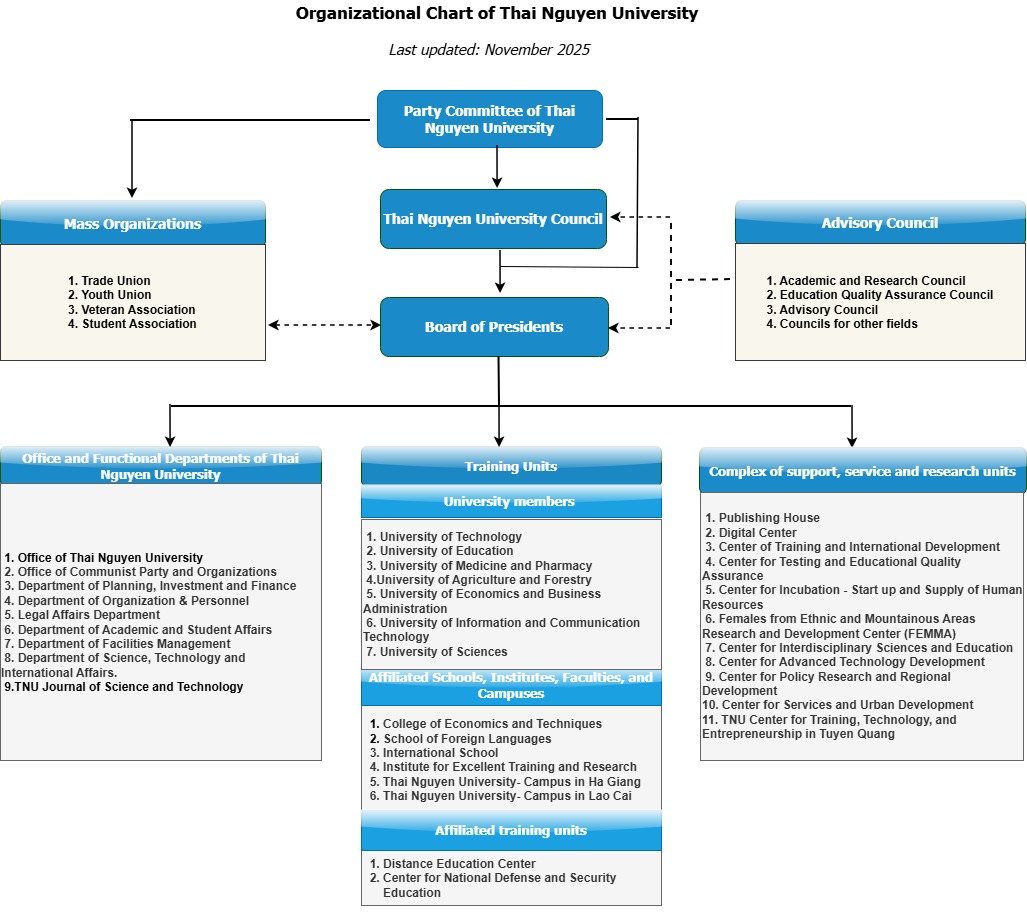
THAI NGUYEN UNIVERSITY (TNU)
President: Assoc. Prof. Dr. Hoang Van Hung
Vice President: Dr. Nguyen Hong Lien
Phone: (+84) 208 3852 650
Fax: (+84) 208 3852 665
Email: vanphong.dhtn@moet.edu.vn
Website: www.tnu.edu.vn
Address: Phan Đình Phùng Ward, Thai Nguyen Province
Development History
With a strategic vision, the Party and Government of Vietnam have identified education, science, and technology as a top national policy. In line with this direction, on January 14, 1993, the Fourth Conference of the Central Committee of the Communist Party of Vietnam (7th Tenure) issued Resolution No. 04-NQ/HNTW on the continued reform of education and training, which specified the task of "building a number of key national universities" to serve as leading institutions and pillars for the country's higher education system.
On April 4, 1994, Thai Nguyen University (TNU) was established under Government Decree No. 31/CP through the merger and reorganization of four universities (Viet Bac University of Education, Bac Thai University of Agriculture No. 3, Thai Nguyen University of Technology, Bac Thai Medical University) and the Viet Bac College of Electrical and Mechanical Engineering in Thai Nguyen City. In 1996, the University of General Studies was established as a member institution of TNU, operating from 1996 to 1998, with the mission of providing foundational general education within a two-stage training process. The establishment of Thai Nguyen University, along with two national universities and two other regional universities, represented a major policy of the Party aimed at creating large, multidisciplinary training centers to meet the demand for high-quality human resources for the nation's industrialization and modernization. This initiative also aimed to enhance competitiveness in education, training, science, and technology amidst deepening international integration.
Leveraging the advantage of consolidating resources from its member units into a unified strength, Thai Nguyen University has rapidly developed new entities. Today, TNU comprises seven member universities (University of Technology, University of Education, University of Agriculture and Forestry, University of Medicine and Pharmacy, University of Economics and Business Administration, University of Sciences, University of Information and Communication Technology), one college, the School of Foreign Languages, the International School, two local campuses of TNU (in Lao Cai and Ha Giang provinces), and 14 supporting units for training and scientific research. Within the member universities, there are five research institutes, a practical training hospital affiliated with the University of Medicine and Pharmacy, and various school-level centers.
Over 30 years of persistent effort and striving towards the government's strategic goals, Thai Nguyen University has continuously grown and strengthened in all aspects. By harnessing the collective power of its member and affiliated units, capitalizing on favorable mechanisms and policies, and strongly promoting democracy, solidarity, dynamism, and creativity among its staff, faculty, and students, TNU has increasingly met the demands for human resource training, scientific research, and technology transfer. It has effectively served the socio-economic development of the Northern Midland and Mountainous region and the nation as a whole, gradually affirming its position and role as a regional university within the education system and in the cause of national industrialization and modernization.
Development Strategy
The Development Strategy of Thai Nguyen University for the 2021 - 2025 period with a vision to 2035 was issued by the TNU Council in Resolution No. 51/NQ-HĐĐHTN on December 21, 2021. This strategy was later revised and supplemented by Resolution No. 95/NQ-HĐĐHTN on December 13, 2023, adjusting the Development Strategy of Thai Nguyen University to 2030, with a vision to 2045. Based on an assessment of its achievements, Thai Nguyen University has set forth its development goals for 2030 and a vision to 2045: "To create a fundamental transformation in the quality of education, scientific research, and technology transfer to meet societal demands and international integration, moving towards a green university model; to focus on developing key and high-priority disciplines that meet regional and international quality accreditation standards; to build and develop shared open educational resources throughout TNU, integrated with an advanced university governance model to realize the vision for 2045 - for TNU to be ranked among the top 500 universities in Asia."



